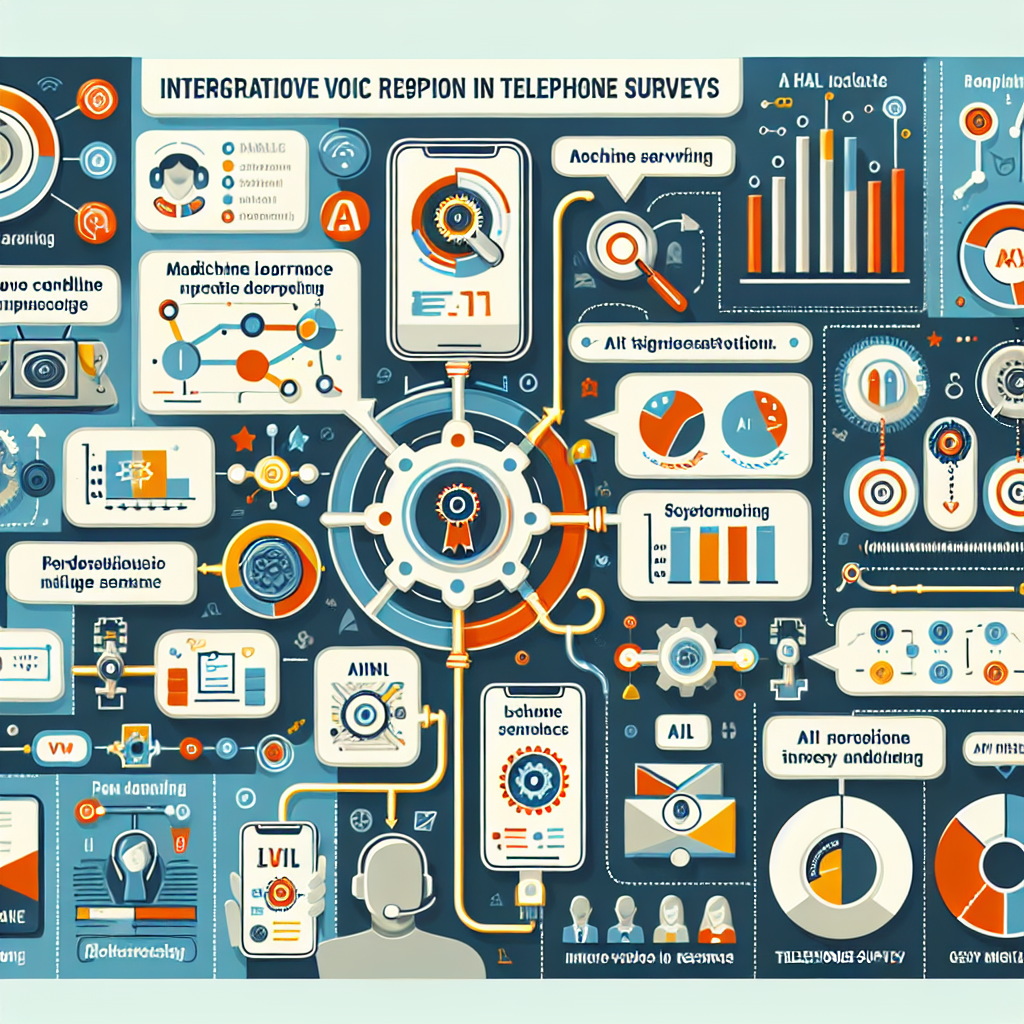
As telecommunication continues to evolve, innovative technologies are redefining traditional methods in virtually every aspect of human interaction. One prominent area experiencing this transformation is in conducting surveys, where Artificial Intelligence (AI) is being integrated into phone survey design and analysis.
The integration of AI into phone survey systems enables automation, precision and efficiency in gathering and interpreting data. Instead of the traditional human-led phone survey, the AI-driven approach uses technologies such as Interactive Voice Responses (IVRs), speech recognition and machine learning algorithms to conduct interviews and analyze responses. These approaches, while eliminating human errors and bias, also offer scalability and speed in data collection and analysis, significantly improving the reach and quality of the surveys.

Moreover, AI’s role in phone surveys is not limited to conducting the interview, but also extends to Processing Natural Language and Sentiment Analysis. AI's ability to understand and interpret human language allows it to process verbal responses, understand the sentiment behind the words, and provide insights that would have been missed in the traditional methods. The importance of AI in modern survey methods is undisputable, particularly in its potential to drive better decisions and strategies based on actionable insights.
The details about how AI technologies are leveraged in phone surveys, and the immense value it adds to data collection and analysis, are discussed in the sections that follow.
As the world becomes increasingly digitized, businesses are seeking to leverage technology in new and innovative ways. One such area where AI (Artificial Intelligence) is making significant inroads is in survey design and analysis. The emerging field of AI-driven survey design promises to bring about a new era of customized, responsive, and intelligent surveys that could potentially transform the way businesses gather and process data.
Traditionally, designing a survey has been a manual process, often involving guesswork and assumptions about the target audience. With AI, however, it’s now possible to create tailored surveys that are specific to the demographic being targeted. For example, SurveyMonkey’s AI technology uses machine learning algorithms to analyze a company’s past survey results, thus predicting and crafting the most effective survey questions for the intended audience.
In addition to personalization, AI also offers the advantage of adaptivity. This means that the survey has the ability to adapt based on respondent interactions. These adaptive surveys can evolve in real-time, changing questions based on previous responses. This technology can help to prevent respondent fatigue, maintain engagement, and obtain more reliable and insightful data.
Moreover, AI contributes significantly to the analysis of data collected from the surveys. It can streamline the most complex data into easily understandable insights. A case in point is the Qualtrics’ AI analytics platform, which uses AI and machine learning to analyze open-text responses faster, uncover key trends, and predict future behaviours.
In summary, AI in phone survey design and analysis is revolutionizing the way businesses understand and interact with their consumers. It provides an unmatched ability to tailor and adapt surveys, while also transforming the collected data into actionable insights. With AI, businesses can thus become more data-driven, customer-centric, and successful in their endeavors.
The advent of Artificial Intelligence (AI) has brought about a revolution in the realm of Phone Survey Design and Analysis. Among the many capabilities AI offer, real-time data analysis stands out, offering a seamless blend of speed, efficiency, and depth. Unlike traditional analysis methods that demand time and intensive labor, AI empowers real-time data analysis, bringing forth a shift in how phone surveys are designed and analyzed.

AI systems analyze survey responses as they come in, allowing survey designers and market researchers to make prompt, accurate, and Data-driven Improvements to the survey. As IBM points out, this real-time approach reduces the 'lag time between data collection and interpretation'. This results in more effective adjustments to the survey questionnaire and quicker strategic decisions.
In addition, AI brings unprecedented depth into the analysis, unearthing patterns, correlations, and insights that might elude human researchers. AI algorithms can find meaning in large, complex datasets that would be challenging or time-consuming for humans to analyze manually. With machine learning and natural language processing techniques, AI can discern sentiments, trends, and Consumer Preferences from open-ended responses to phone surveys.
Real-time data analysis also aids in respondent engagement. AI can predict respondent drop-off points and adjust the survey flow to increase completion rates. By delivering rich and fresh insights, AI augments phone survey design and promises Real-time Improvements to customer engagement and marketing policies. Thus, harnessing the power of AI in phone survey design and analysis is not just an option but a necessity in the data-infused business landscape.
In the ever-evolving world of technology, the use of Artificial Intelligence (AI) in phone survey design and analysis offers a unique approach to improving respondent engagement levels. AI-enabled phone surveys not only inspire more participations but also improve the completion rates and enhance the quality of the data garnered.
AI is instrumental in curating personalized questions that delve into the depths of the respondent's profile, making them feel valued and enhancing their willingness to participate. Through machine learning algorithms, these surveys can interpret initial responses and adapt the following questions to align with the participant's profile and response pattern - a feature not accessible in conventional surveys.
Moreover, AI brings interactive elements to the table. Taking an engaging conversational approach, AI systems deliver a human-like interaction that is both compelling and interactive. This interaction is often facilitated by chatbots, virtual assistants that add a conversational flavor to the survey, responding in real-time, addressing queries, and leading the respondent effortlessly through the survey.
AI in phone surveys doesn't just stop at engagement. It lends a hand in the analysis of data as well. Advanced algorithms analyze the data, interpreting patterns, identifying trends and making predictive analytics more accurate. The resulting rich, high-quality data provides invaluable insights and actionable intel that aids strategic decision-making. Thus, AI in phone survey design and analysis ensures a more refined data pool and rewarding results, apart from boosted respondent engagement levels.
To summarize, the era of AI in phone surveys is here, bringing with it rewards that extend beyond just enhanced respondent engagement. It’s about time that organizations embraced this technology to delve deeper into the psyche of their audience, personalize their experience, and subsequently, make more informed, data-driven decisions.
The use of Artificial Intelligence (AI) in phone survey design and analysis is reshaping the landscape of research. However, the implementation of this cutting-edge technology does not come without challenges. One major area of concern is privacy, as AI gathers and processes respondents' information. Privacy regulation is increasing worldwide, meaning businesses need to ensure a high level of data security, particularly when handling personal data.

Another critical aspect to consider is the transparency of AI models being used. The so-called 'Black Box' issue of AI refers to the inability to understand the decision-making process within an AI system. Without clarity on how these decisions are made, trust can quickly erode.
Data accuracy is also crucial in getting meaningful insights from AI-powered phone surveys. Although AI can process vast amounts of data, it's not immune to biased data or incorrect data entry. Ensuring data accuracy therefore needs to be a rigorous part of any AI implementation plan.
Overall, while AI offers significant potential to disrupt and improve phone surveying, these challenges require careful consideration and strategic planning. As the technology continues to evolve, so too will the ways in which we overcome these hurdles.
In a world increasingly relying on data-driven decision making, application of AI in phone survey design and analysis brings unprecedented value. Around the globe, numerous companies are experiencing transformational results by utilizing AI to streamline the survey process and harness intelligent insights.
Arguably one of the most known uses of AI in survey analysis is the use of IBM's Watson. For example, global market research company Staples leveraged Watson's AI capabilities to analyze customer feedback from phone surveys. By integrating AI into their system, they were able to analyze surveys at an increased rate while also gaining in-depth customer insights.
Another notable case is the use of AI by The Climate Corporation. The company successfully used AI to analyze phone survey responses from thousands of farmers in order to improve their crop yields. AI's ability to handle and analyze large datasets helped the company to pinpoint the precise needs of farmers and devise solutions. The result was improved yields and a major stride in agriculture.
AI's contribution to survey analytics can also be observed in healthcare. A healthcare research firm, Meadowlands Hospital, used AI-powered phone surveys to garner patient feedback. AI's advanced text analysis and predictive capabilities helped Meadowlands to identify patient satisfaction levels and areas requiring improvement. This engagement effectively showcased how AI's powerful analytical capabilities can benefit an organization's decision-making process.
These case studies are a testament to AI's potential in transforming phone surveys into powerful tools for data collection and analysis. The integration of AI not only expedites the process but also unveils insights that would likely be missed with traditional survey methodologies. As AI continues to progress, we can expect its contribution in surveys and analysis to become even more significant.
Start your free trial for My AI Front Desk today, it takes minutes to setup!








